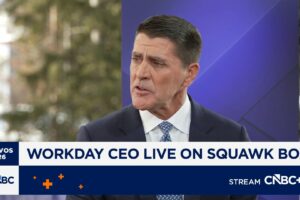We recently compiled a list of the 35 AI Superstars According to Goldman Sachs. In this article, we are going to take a look at where Alphabet Inc. (NASDAQ:GOOG) stands against the other AI superstars according to Goldman Sachs.
US technology stocks have surged dramatically this year, largely driven by the growing excitement surrounding generative artificial intelligence (AI). However, according to research by investment firm Goldman Sachs, this rise is not indicative of a financial bubble like those of the past. The performance of these companies is expected to continue delivering solid returns to investors, fueled by the rise of AI superstars outside of the magnificent seven, among smaller tech firms and in non-tech sectors as well. However, Peter Oppenheimer, the bank’s chief of global equity strategy and the head of macro research in Europe, has advised investors to diversify their portfolios to manage risk.
While tech stocks have been dominant, contributing 32% of global equity returns and 40% of US equity returns since 2010, these returns are underpinned by strong financial fundamentals rather than speculative bubbles. The earnings per share for the tech sector have increased by 400% since the peak before the 2008 financial crisis, far outpacing other sectors, which collectively saw only a 25% increase. A key driver behind the outsized returns in recent years has been a small group of hyperscale companies, particularly those in software and cloud computing. These companies have leveraged their vast resources and high profitability to dominate the market, with recent performance surging even further due to optimism around AI.
Read more about these developments by accessing 30 Most Important AI Stocks According to BlackRock and Beyond the Tech Giants: 35 Non-Tech AI Opportunities.
This has led to rising valuations, largely concentrated among a narrow group of market leaders. Peter Oppenheimer observes that this pattern mirrors historical trends in technological innovation. From the construction of canals in the 18th century to the adoption of the telephone, new technologies often attract vast capital and competition. Although this does not always result in financial bubbles, there is typically a period where prices decline as competition intensifies, ultimately leading to consolidation in the market. Over time, only a few large companies remain dominant, while growth shifts to secondary innovations that build on the original technology. The AI era is unique in that the dominant companies, which lead in AI, were also at the forefront of the previous tech wave — particularly in software and cloud services.
Their scale and profitability have positioned them well to absorb the high costs of AI investments. However, Oppenheimer notes that new competitors are emerging. The number of AI patents skyrocketed to over 60,000 in 2022, up from around 8,000 just four years earlier, suggesting that AI is following the typical pattern of large-scale capital growth and competition. Oppenheimer also points out that the companies pioneering a new technology are not always the ones that will create the most value from it in the long run. For instance, during the internet boom, telecom companies received significant investment, yet it was companies like those in social media and ride-sharing that capitalized on the internet infrastructure and achieved the greatest success. Similarly, as AI evolves, new companies could emerge as the next wave of tech superstars, reshaping industries beyond the current giants.
Let’s now take a look at the list of 35 AI superstars that are on the major bank’s radar. We compiled this list after consulting a report by the bank on the AI industry. These stocks are also popular among elite hedge funds and hedge fund sentiment is an important indicator that we pay a lot of attention to at Insider Monkey.
Why are we interested in the stocks that hedge funds pile into? The reason is simple: our research has shown that we can outperform the market by imitating the top stock picks of the best hedge funds. Our quarterly newsletter’s strategy selects 14 small-cap and large-cap stocks every quarter and has returned 275% since May 2014, beating its benchmark by 150 percentage points (see more details here).

A laptop and phone open to Google’s services in an everyday setting.
Alphabet Inc. (NASDAQ:GOOG)
Number of Hedge Fund Holders: 165
Alphabet Inc. (NASDAQ:GOOG) is a California-based technology company that owns and runs the internet search engine Google. Waymo, the autonomous driving technology company led by Google, recently announced that it had entered into a deal with carmaker Hyundai to get the IONIQ 5 EV, developed by the latter, as part of the Waymo robotaxi fleet. In the first phase of the deal, the two companies will integrate the sixth-generation fully autonomous technology, named the Waymo Driver, into the IONIQ 5 SUV, which will be added to the Waymo One fleet. The report predicts that the initial on-road testing with Waymo-enabled IONIQ 5s will start before the end of next year. The Hyundai SUV will be manufactured in the US.
Latest reports, published by news platform TechCrunch, indicate that Alphabet Inc. (NASDAQ:GOOG) intends to start showing ads in AI Overviews, the AI-generated summaries it presents for certain Search prompts, and will also add links to relevant web pages or some of those summaries. Per the reports, the company is also launching AI-organized search results pages in the US this week.
Overall GOOG ranks 6th on our list of the AI superstars according to Goldman Sachs. While we acknowledge the potential of GOOG as an investment, our conviction lies in the belief that some AI stocks hold greater promise for delivering higher returns, and doing so within a shorter timeframe. If you are looking for an AI stock that is more promising than GOOG but that trades at less than 5 times its earnings, check out our report about the cheapest AI stock.
READ NEXT: $30 Trillion Opportunity: 15 Best Humanoid Robot Stocks to Buy According to Morgan Stanley and Jim Cramer Says NVIDIA ‘Has Become A Wasteland’.
Disclosure: None. This article is originally published at Insider Monkey.












